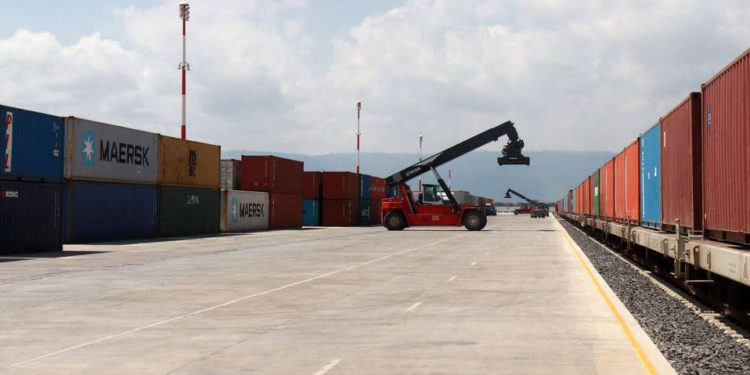Transit cargo through the Naivasha Inland Container Depot has started making good progress after the Kenya Railway rescinded its early decision to make it mandatory for Uganda, Rwanda and South Sudan to use the facility, after a court ruling that was followed by a public notice early this week.
Four cargo trains carrying 436 Twenty Foot Equivalent Units (TEUs) delivered the cargo to the Naivasha ICD during the week ending on 7th, according to weekly data released by the Kenya Railways. Each train pulled between 54-55 wagons carrying heavy load containers.
All the government agencies, according to KR have their officers located in Naivasha with clients been sensitized to use the facility.
“There are talks with the partner states to reach out to their freight stakeholders to use the facility” KR officials said, adding that loading from Mombasa to Naivasha through Standard Gauge Railway was still going on.
When the directive for mandatory use of SGR Naivasha depot was made, the Ugandan government requested to be given an option in using the facility. The Minister for Roads and Infrastructure in Uganda Eng Edward Katumba wrote to his Kenyan counterpart James Macharia, saying that this decision was arrived at after the notice was reviewed by his ministry and the private sector.
He further said that if the Kenya government made it more attractive, big industry players like Bollore Logistics, Mukwano Group of Companies and others could be encouraged to start using this facility because of economies of scale
Kenya Ports Authority (KPA), which is the lead agency, had provided requisite office accommodation and had requested revenue authorities in Uganda, Rwanda and South Sudan to deploy staff to make clearance of the cargo through ICD fully functional by 1st June.
The Kenya International Freight and Warehousing Association (KIFWA) Board of Directors also asked the industry players to promote Through Bill of Lading for the Naivasha ICD bound cargo to cushion importers against high demurrage charges likely to be incurred on delay in delivery of empty containers.
The contract on international carriage of goods by sea has set clear guidelines on where the obligations of the shipping line commences and ends. TBL refers to a single bill of lading covering receipt of the cargo at the point of origin for delivery to the ultimate consignee at a named place in the hinterland, either Embakasi Internal Container Depot (ICD) or Naivasha ICD in case of Kenya’s SGR.
For those using TBL at the ICDs, the responsibility of returning the container to the shipping line is minimized. The importer will need to adhere to the rules set out in the ‘Guarantee Form’ that the shipping lines issues when it hands over the container and the cargo to the consignee at ICD.
“The ‘Guarantee Form’ clearly indicates where and when they will return the container to and the numbers of days they have in which to honour this agreement,” Kenya Ships Agents Association (KSAA) Chief Executive Mr Juma Tellah said in an earlier interview.
The role of Naivasha as a tool to ease transit cargo came into sharp focus during a recent virtual meeting to discuss the new normal in logistics organized by African Logistics Properties (ALP), which pointed out a need to create supportive infrastructure to enable the facility to handle more goods.
As it stands out today, according to Gilbert Langat of Shippers Council of East Africa (SCEA), it was more costly to use the facility since it was not clear on whether to use TBL, lack of designated empty container drop points and last mile transport.
In the latest move to attract shippers to use the Inland Container Depot (ICD) from Mombasa to Naivasha, Kenya Railways reduced freight charges from $600 to $480 for a 20-foot container and from $850 to $680 for a 40-foot container. The Corporation reiterated that the railway line offers a service that is premised on safety, efficiency and reliability and extended the free storage period to 30 days.
Good roads, housing to accommodate ICD users and other supportive infrastructure such as warehouses are needed to allow logistic players to use the facility for transit cargo.
According to Richard Hough, the Chief Executive Officer of ALP, if supportive infrastructure and the country can guarantee the market sustainability, ALP would consider investing in modern warehousing in the region.
“We would absolutely take the demand. But since warehousing is an intensive capital venture, the issue of sustainability is critical,” Hough noted, adding that the company has now introduced short term lease measures to meet the demand brought about by Covid 19 pandemic.
Added he; “We need to understand the rules that will make the venture successful. We are looking at the sustainability of the relations between Kenya and its neighbours. It is an area we would look forward to investing in.” Hough said.
Joshua Rugema, Chief Executive Officer (CEO) of the East Africa Exchange Commodities, a Rwandan based firm that runs a commodity e-trade platform, also said that supportive infrastructure in Naivasha would would see Rwanda invest in warehousing since they as well need the Northern Corridor in addition to Dar corridor.





